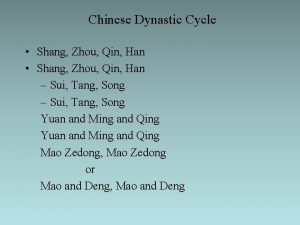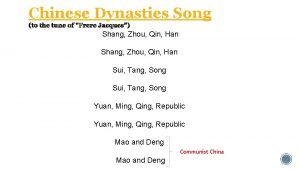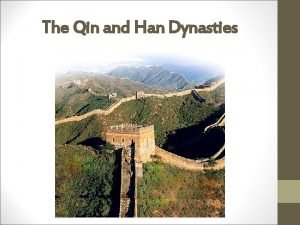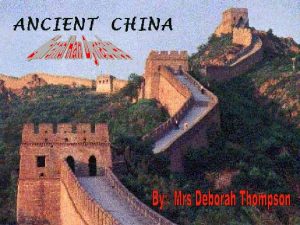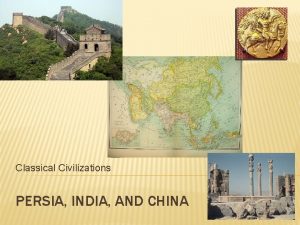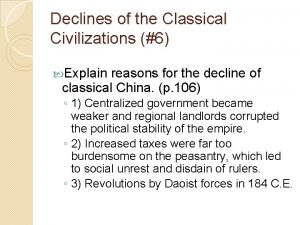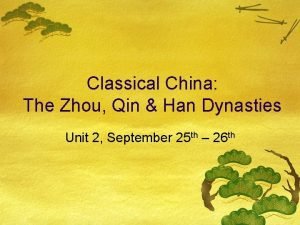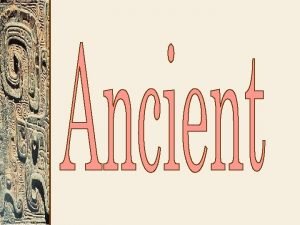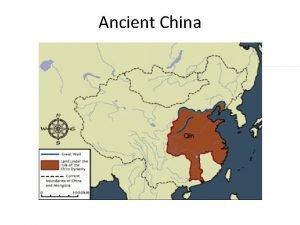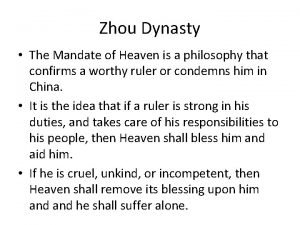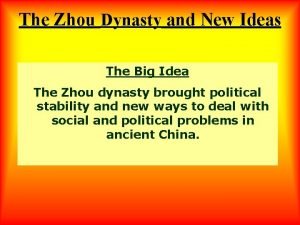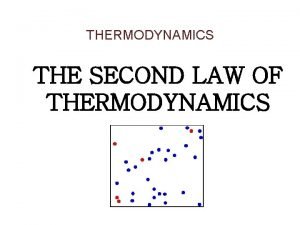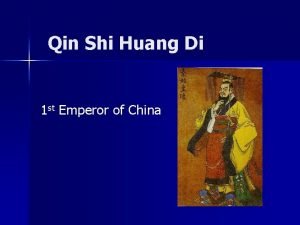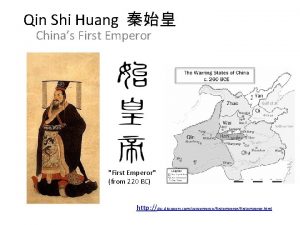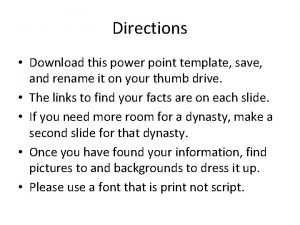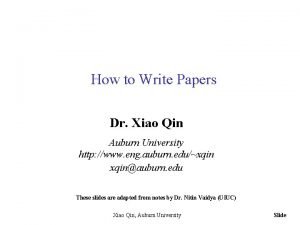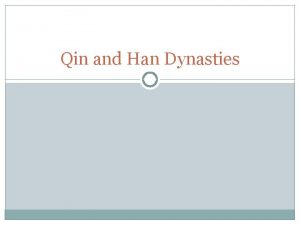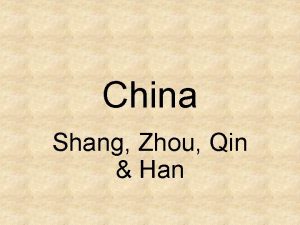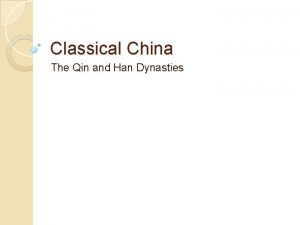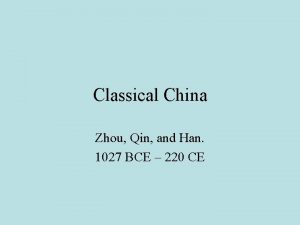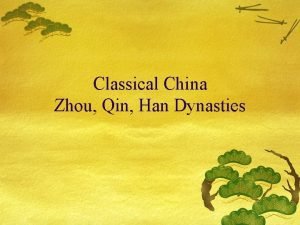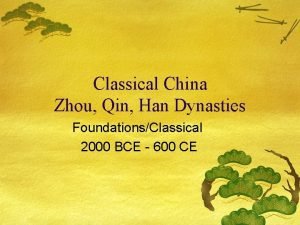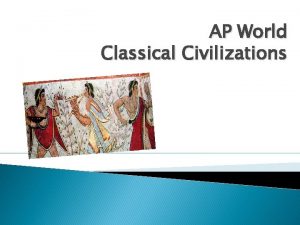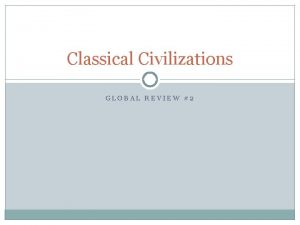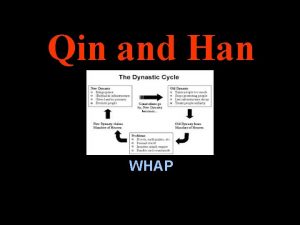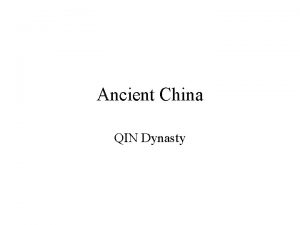Development of Classical Civilizations China Zhou Qin and




















- Slides: 20

Development of Classical Civilizations: China (Zhou, Qin, and Han) & Confucianism Dr. Joshua Fan Email: jfan@utep. edu 1

2

Oracle Bones (ca. 1200 BCE) King Wu Ding (r. 1250– 1192) 3

Inscribed Oracle Bones 中國 Zhongguo China 4

Western Zhou Dynasty (1045– 771 BCE) 5

Confucius (Kong Fuzi) (551– 479 BCE) & Selection of The Analects Confucianism ≠ religion! DUTY!! Family Country • What is wisdom? • To give one's self earnestly to the duties due to men, while respecting spiritual beings [gods & ghosts], to keep away from them, may be called wisdom. (6. 20) 敬鬼神而遠之、可謂知矣。 6

The Five Cardinal Relations 1. 2. 3. 4. Father - Son 父子 Ruler - Subjects 君臣 Husband - Wife 夫婦 Elder brother Younger brother 兄弟 5. Friend - Friend 朋友 8

Junzi 君子 vs. Xiaoren 小人 “Gentleman” / the Consummate Person vs. “Small man” • The Master said, “The mind of the gentleman is conversant with righteousness; the mind of the small man is conversant with gain. ” (4. 16) • The Master said, “The gentleman thinks of virtue; the small man thinks of comfort. The gentleman thinks of the sanctions of law; the small man thinks of favors which he may receive. ”(4. 11) • The Master said, “There are three things of which the gentleman stands in awe. He stands in awe of the ordinances of Heaven. He stands in awe of great men. He stands in awe of the words of sages. The small man does not know the ordinances of Heaven, and consequently does not stand in awe of them. He is disrespectful to great men. He makes 9 sport of the words of sages. ” (16. 8)

Good Governing by example and through virtue • The Master said, “If the people be led by laws, and uniformity sought to be given them by punishments, they will try to avoid the punishment, but have no sense of shame. If they be led by virtue, and uniformity sought to be given them by the rules of propriety, they will have the sense of shame, and moreover will become good. ”(2. 3) • “Sir, in carrying on your government, why should you use killing at all? Let your desires be for what is good, and the people will be good. The relation between superiors and inferiors, is like that between the wind and the grass. The grass must bend, when the wind blows across it. ” (12. 19) 10

ren 仁 (Humanity) • The stable being burned down, when he was at court, on his return he said, “Has any man been hurt? ” He did not ask about the horses. (10. 12) • Zigong asked, saying, “Is there one word which may serve as a rule of practice for all one's life? ” The Master said, “Is not RECIPROCITY such a word? Do not do unto others what you would not have them do unto you. ” (15. 23) 11

xiao 孝 (Filial Piety) Ziyou asked what filial piety was. The Master said, “The filial piety of now-a-days means the support of one's parents. But dogs and horses likewise are able to do something in the way of support; without reverence, what is there to distinguish the one support given from the other? ” (2. 7) 1. To honor, to obey, and to take care one’s parents 2. To take care yourself, so your parents won’t worry about you 3. As a male it’s your job (filial duty) to extend the family line 12

Supreme Sage and Foremost Teacher 至聖先師 • The Master said, “In teaching there should be no distinction of classes. ” (15. 38) • The Master said, “I do not open up the truth to one who is not eager to get knowledge, nor help out any one who is not anxious to explain himself. When I have presented one corner of a subject to any one, and he cannot from it learn the other three, I do not repeat my lesson. ” (7. 8) 13

Qin: from Kingdom to Empire 14

Qin Dynasty (221– 206 BCE) Qin Shi Huangdi (r. 247– 210 BCE) 15

The Great Wall (15 th century-version) 16

Terracotta Army 17

Terracotta Army—Pit 1 18

Terracotta Army—Pit 2 19

Terracotta Army—Pit 3 20

The Han Dynasty (206 BCE – 220 CE) 21
 Shang zhou qin han song
Shang zhou qin han song Collective farm
Collective farm China qin dynasty map
China qin dynasty map How did shi huangdi deal with people who opposed him?
How did shi huangdi deal with people who opposed him? The two classical civilizations of ancient india were the
The two classical civilizations of ancient india were the What caused the decline of classical civilizations
What caused the decline of classical civilizations Ancient china roads
Ancient china roads Zhou
Zhou China zhou dynasty
China zhou dynasty Zhou dynasty wars
Zhou dynasty wars Inca vs maya
Inca vs maya Mandate of heaven zhou
Mandate of heaven zhou Zhou dynasty politics
Zhou dynasty politics Comparative development experiences of india and china
Comparative development experiences of india and china China aerodynamics research and development center
China aerodynamics research and development center Wnet = qin - qout
Wnet = qin - qout Emperor qin quotes
Emperor qin quotes Qin shi huang ror
Qin shi huang ror Zhou dynasty facts
Zhou dynasty facts The han dynasty inventions
The han dynasty inventions Xiao qin auburn
Xiao qin auburn
